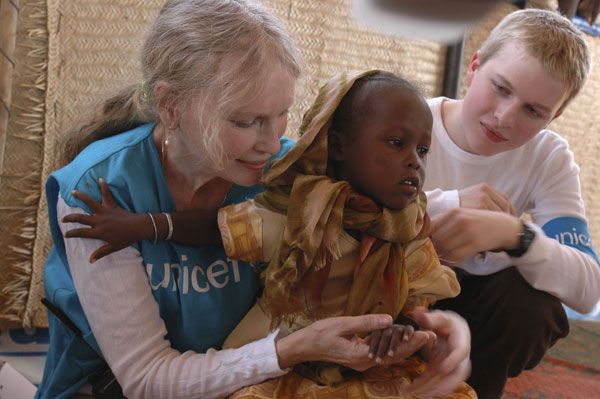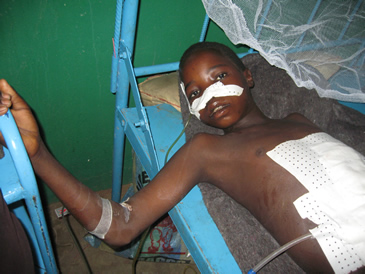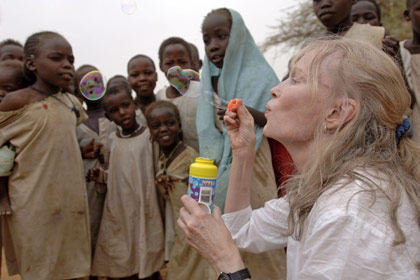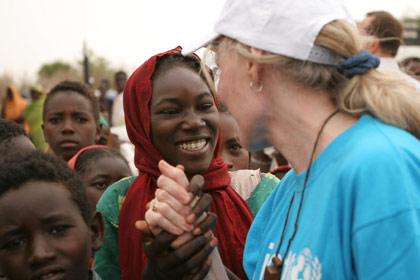Not everyone reads a grim news story and gets on a plane to head for a war zone. But not everyone is Mia Farrow. The iconic actress is best known as Woody Allen’s former leading lady—starring in films such as Hannah and Her Sisters, The Purple Rose of Cairo, Crimes and Misdemeanors, and Husbands and Wives. But after a spate of op-eds appeared in recent months, Farrow has become widely recognized as an impassioned political campaigner—stumping on TV shows, and testifying before Congress. Her current cause? Darfur.
These days most celebrities come with a cause, and sometimes, suspiciously, that cause is attached to a product that needs peddling. The difference with Farrow is simple: she does her homework. She has visited Darfur and neighboring countries 6 times since 2004; she doesn’t shy away from dangerous places—and she gets results.
After returning from her first trip to Darfur, Farrow launched a website, www.miafarrow.org where she documented the atrocities she witnessed with photographs and commentary. But it’s her op-eds, two of them written with a co-author—Ronan Farrow, her son and a precocious 19-year old Yale Law student, or the Nobel Peace Prize winning activist Jody Williams—that have been her weapon of choice. It was in direct response to these op-eds, plus letters that Farrow wrote to her personal contacts, that the Chinese government decided to withdraw their powerful opposition to UN peacekeepers in the region. Oh yes, and along the way, she publicly likened Steven Spielberg to a Nazi propagandist.
How are all these things connected? It breaks down like this: since China is the major buyer of Sudanese oil, Darfur advocates have targeted China as enablers of the genocide in Sudan. Those same advocates proceeded to dub the Beijing Olympics of 2008, a point of pride in China, the “Genocide Olympics.” Spielberg is helping China to stage the games, so Farrow turned her sights on him.
In a March 2007 op-ed, written with her son and published in The Wall Street Journal, Farrow wrote, “Does Mr. Spielberg really want to go down in history as the Leni Riefenstahl of the Beijing Games? Do the various television sponsors around the world want to share in that shame? Because they will. Unless, of course, all of them add their singularly well-positioned voices to the growing calls for Chinese action to end the slaughter in Darfur.”
I called Farrow at her home in Litchfield County, Connecticut, just days before she would embark on her seventh trip to Africa.
—Joel Whitney for Guernica

Guernica: When did you first get involved with Darfur? Where did you first hear about the atrocities?
Mia Farrow: You know, it was actually two articles by [the Pulitzer prize winning journalist] Samantha Power. On the tenth anniversary of the Rwanda genocide, she wrote a very powerful op-ed that appeared in the New York Times, and my knees buckled. And apart from that op-ed, it was completely beneath the media’s radar. I had to scrounge around the Internet to find anything at all. I was astounded that this was ongoing and astounded that it was not being reported.
What I had learned, what I had seen, what I had been told, changed my life; I was now a witness.
I then read another far lengthier piece that Samantha wrote for the New Yorker that spoke at length about her visit to Darfur, her findings, her meetings with people. I was already a UNICEF ambassador, and I called UNICEF and said, “I need to go to Darfur. Something terrible is happening in the Darfur region of Sudan.” Eventually UNICEF got me to Darfur. I tried to prepare myself by reading everything I could: a history of Sudan, generally, and all about the uprising of 2003, triggered by the very real disenfranchisement of the Darfur region, in response to which the government of Sudan and their proxy, Arab militia who have come to be known as Janjaweed (or “devils on horseback”) launched an all-out campaign of genocidal slaughter upon the entire civilian population of Darfur.
I read what I could; still, there was no way to be fully prepared emotionally for what I saw. I cannot even begin to convey it. My photographs can’t convey it. My words can’t convey it. I can tell you that I left Darfur a different person. What I had learned, what I had seen, what I had been told, changed my life; I was now a witness. And this was a responsibility for me that clearly eclipsed everything in my life except my children. It seemed the only appropriate response, and I didn’t have a choice.
Guernica: When was that first trip?
While I was there, there were villages on fire, and people standing dazed… a mother whose children had been thrown into their burning home the day before, sitting under a tree, her eyes swollen, empty of tears.
Mia Farrow: 2004. I returned to Darfur last June. By then it had become impossible to speak of Darfur, which I was doing at colleges, without including Eastern Chad. As feared, as predicted, Darfur’s violence spilled across its porous borders reaching well into Chad, and the Central African Republic [known as CAR]. I didn’t know anything about Chad so I said I would like to go to Eastern Chad. Well, UNICEF said it was too dangerous, that they were actually in the process of evacuating. So I went as a private person, not as a UNICEF ambassador. I got myself to Eastern Chad. And that was a terrible week in November when sixty villages were destroyed. Darfur’s janjaweed had crossed into Eastern Chad on a rampage and burned sixty villages.
There were villages on fire, all around. You will see on my website three men lying side by side, their eyes gouged out by janjaweed knives; the mother whose children had been thrown into their burning home the day before, sitting under a tree, her eyes swollen, empty of tears; people stranded under trees just dazed and terrified; some had belongings, whatever they could carry when they ran; most had nothing, nothing at all. And their attackers, the janjaweed, were all around; we were all surrounded.

When I came to Tamadjour, you can see on the website, I met Mr. Joseph Omar, who was going to the still smoldering ashes of what had been his village. He went to search the granaries to see if there was anything he could carry back to his family. But the granaries had been broken to smithereens. The grain was burned. He gathered just some melted pots and, with arms full, he was trying catch a chicken; and we helped him put the chicken in the car and brought him to where his family lived. Which was just under a tree.
Honest to God, from the Darfur border to the tiny town of Goz Beida, under tree after tree after tree, people were clustered, not knowing where to go or what to do. The UN High Commission for Refugees were really struggling because they are simply for refugees, and we’re talking about internally displaced people, people made homeless within their own country. And there was only so much they could do. Yet the enormity of the humanitarian catastrophe was suddenly in their laps too, and they were unable to move people by their own mandate. Nothing was in place for these suddenly displaced people.
It was a nightmare; it was an inferno. Dante himself would surely shudder. Horror, horror, mutilations; people were just pouring out of the medical center’s mere five rooms, wounded and with hands chopped off, people howling, people silent, babies dying—just all of it, all of it. This is what Darfur was like in 2003 and early 2004. But by the time I got there in 2004 there was an infrastructure in place in Darfur—very fragile, but an infrastructure. The camps had been set up. Tarps had been lashed to the desert floor. There were bladders of water being trekked in and aid workers were struggling to sustain the displaced people in Darfur. It was a traumatized population suddenly finding themselves in these circumstances—this is what I was seeing, in the immediate sense, in Eastern Chad. And I thought, do people know what’s happening here?
Guernica: I want to read you something written early in the Bush presidency: “An aide sent a memo to President Bush detailing the Clinton administration’s reluctance to act [in Rwanda]. President Bush’s four-word response to this failure to stop genocide, which he jotted in the memo’s margins, could not have been clearer: ‘not on my watch.’” This is a president who is also said to be the first to utter the word “genocide” while in office; and he started a war in the Middle East, in part, to punish something like a genocide. So why hasn’t anything been done in Darfur?
Mia Farrow: At that moment [when the White House called the atrocities in Darfur “genocide”], if not before, a special envoy should have been appointed, with offices in Sudan and in D.C. And an all-out attempt for a peace process, one that would be deemed to be just to Darfur’s people, should have been in the works. But that didn’t happen. There were long months with no envoy at all. And what we have now is a part-time envoy.
What can one conclude here? We have the White House using the word “genocide” and Colin Powell quickly following that by saying, in effect, “This doesn’t mean we have to do anything about it.” (His saying that rendered useless the Genocide Convention, by the way.) I have to assume, leaping back in perspective, that there is a larger Monopoly game going on here, one in which Darfur’s people are simply expendable chips. After this many years—now we’re entering the fifth year—what signal have we given to Darfur’s people? All this talking. All this hand-wringing of the United Nations.
Guernica: Clearly the Bush administration has relinquished its credibility on most issues. But is there no country, no government at all, that has stood up or gone to bat for the people of Darfur?
Mia Farrow: My understanding on this comes from a talk [UN Deputy Secretary-General] Mark Malloch Browne gave at Yale Law School last year. Under harsh questioning from a Yale Law student, who happened to be my son Ronan, he admitted that after Resolution 1706, the UN had gone from door to door, nation to nation, requesting that troops be donated. You may recall that UN Resolution 1706, as outlined by Kofi Annan, specified that 22,500 peacekeepers be deployed in the Darfur region immediately. But it concluded by requesting permission of the government of Sudan.
Guernica: Permission?
Mia Farrow: Right. Under these auspices every nation refused to contribute troops, signers and non-signers alike refused. My understanding from Mark Malloch Browne is that four nations stepped up. Two were Norway and Sweden. The other two—I’m not sure—may have been Bangladesh, Jordan. Given that it was four countries, the sum-total was a mere 400 soldiers. In all the world. To say the least, that is obscenely inadequate, and of course nothing came of Resolution 1706. It was apparently still-born, though it is referred to from time to time, even by the government of China.

Guernica: I understand from NPR, via their website, that Republican Congressman Ed Royce was visibly moved after your slideshow and presentation before Congress and that he told you to go show it in China?
Mia Farrow: I guess anyone who showed up at that hearing would already have been on the same page. The piece that I had written with my son Ronan had just appeared in the Wall Street Journal. And it had provoked a response from China, it seemed—I mean at least verbally. The Chinese ambassador to the United States had written a letter to the Wall Street Journal, an angry letter expressing outrage that the Olympics would be tied into the genocide in that way. It got so much attention that my whole website crashed. But ultimately an envoy was sent from China to Darfur; things were said by the Chinese; suddenly there was support for UN Resolution 1706, for the peacekeepers to be sent to Darfur of the sort outlined in Resolution 1706.
Everyone has come to realize that China is a huge player in this situation. When it comes to the Olympic games, what hit me was their slogan: “One World, One Dream.” So I started with the idea that it’s more like “one nightmare.”
People credited the piece for having triggered this; but I say no. Would that I could say that. Talk is cheap. My understanding is that China has hired a massive press agency working out of Washington, DC, whose job is to create good publicity for China. So China’s donations to the humanitarian efforts in Darfur, China’s words of support for the peacekeeping process… While these are welcome, until the people of Darfur experience safety, it’s simply words. You want to say, “Please China, let it be true. Use your unique point of leverage to persuade the government in Khartoum to do these things, to admit the peacekeepers, stop the bombings, to rein in the janjaweed.”
Guernica: That seems like a remarkable turnaround on the part of China, even just verbally. A lot of people have been talking and scratching their heads on this issue for a long time—divestment campaigns, letters to the editors, audiences with world leaders. It doesn’t seem before your op-ed there was any sign of movement among the Chinese. Was it the phrase “the Genocide Olympics”? And did you coin this phrase?

Mia Farrow: I don’t know who first said it. It may have been someone at the Washington Post. But it was grabbed by the respected Sudan scholar Eric Reeves, who was convinced from the outset that China was the point of leverage for the UN and that the Olympic games would be a point of leverage for China. My son Ronan wrote a piece in the Wall Street Journal called “China’s Crude Conscience.” It was very apparent, then, that China’s oil entanglements with Sudan made them complicit in the genocide in Darfur, and all the ways were outlined in that piece.
But what precipitated that piece was when I was on Chris Matthews’s Hardball on MSNBC. After that show was over, off air, Matthews said, “What does China have to do with this?” And it was another jaw-dropping moment; I’d just assumed that everybody knew what China had to do with it! And so Ronan wrote that piece on China’s complicity. And then I’m watching C-Span about a week later and I see Senator Chris Dodd on television recommending to the Senate that everybody read Ronan’s piece.
Between then and now everyone has come to realize that China is a huge player in this situation. And when it comes to the Olympic games, what hit me was their slogan: “One World, One Dream.” So I started writing another piece with the idea that it’s more like “one nightmare.”
Guernica: Steven Spielberg was somehow targeted as complicit in this nightmare?
Mia Farrow: What we discovered was that Steven Spielberg had signed on to stage the 2008 Olympic games. I wrote him a letter and said, “You’re aware of China’s complicity?” and I sent him Ronan’s piece and I outlined it all for him. I had already been in touch with him previously. I told him about Darfur. I sent him a whole lot of photographs in a hardcover iBook. And on each page I hand-wrote the story of each person, and through the pictures conveyed what I hoped was the entire scenario, and sent that along with my op-eds, which are pretty descriptive, as you know. But none of this got a response.
But then when I heard that he was involved with the games I wrote another letter. And by then I was on Darfur time. You know 10,000 people a month are dying. It gives you a sense of urgency. I couldn’t wait any longer. So then my son and I wrote that article you’re referring to.
Guernica: In which you compared Spielberg to Leni Riefenstahl.
Mia Farrow: We didn’t compare him to Leni Riefenstahl. We cautioned him that’s how he could go down in history, so he wouldn’t do it. We hope it was reasonable.
Guernica: Has he been properly brought up to speed, in your view?
Mia Farrow: He wrote a letter to President Hu. Given that it’s Spielberg, it probably reached President Hu’s desk. That’s important. The letter’s on the internet, and it’s a good one. That’s important. What came of that, I don’t know. From what I understand, he feels that he wants two bites of the apple. But I’m getting this third-hand. The first bite is that he makes his feelings clear and what needs to be done clear. And then I would assume, I would hope — I would assume! — he could not continue his participation, his cooperation and assistance in the games. I would assume he would then quit. I just assume; he’s a decent man and how could anyone continue? But perhaps there are things going on that we don’t know about. As we said in the piece, he too has a point of leverage. And I don’t know how effective it will be. And each of his sponsors has a responsibility as well. Every participant. [See sidebar]
Guernica: One perception about celebrities getting involved in something like this is that it may make ordinary people feel that only celebrities can weigh in and make a difference. What is required of the non-celebrities out there, who become witnesses secondhand?
I said to Kofi Annan, “I’m not suggesting you douse yourself with kerosene. But you could resign.”
Mia Farrow: The humanitarian aid workers need our support. We really have to keep the pressure on our leadership, whatever state we’re in, to keep contacting them. I actually printed from John Prendergast’s book [Not on Our Watch: The Mission to End Genocide in Darfur and Beyond, co-authored with actor Don Cheadle], a form letter into which I inserted my own stuff. Not that people should print out the form letter—but using this as an example of what they might request of their leadership. It’s all there. First and foremost what we want our government to do is get behind a peacekeeping process. The envoy can’t be part time. The envoy has to be fulltime and first rate, because ultimately the solution lies at the conference table. For that to happen, all parties have to be at that conference table.
Guernica: What kinds of numbers are there? How many dead?
Mia Farrow: We now have 80%-90% of Darfur’s villages bombed and burned. Two and a half million people driven into camps. Four million now require food aid from the World Food Program. But no one is counting the dead. If you ask Eric Reeves he would say upwards of 500,000.
Guernica: Right, a year ago he was saying 400,000.
Mia Farrow: And the UN sticks to a figure until there’s another. For years, they were sticking to 70,000 until that became an obscenity, when they moved it up to 200,000. And they’ve been sticking there for I don’t know how many years. The truth is they don’t know.
Could there not then be a standing body within the UN that, when a government is killing its own people, that body comes to protect those people within a number of days?
But while we’re dreaming, may I say that Sudan purchased the best watchdog on the Security Council, with China rendering toothless every single resolution to assist Darfur’s people. I wrote a letter to Kofi Annan, regarding UN Resolution 1706. The one powerful thing I thought he could do, with just weeks remaining in his tenure, would have been to resign. I cited to him the example of the documentary Fog of War, in which a young father set himself on fire in front of then-Secretary of Defense Robert McNamara. In reliving this moment, it was the single thing that brought Robert McNamara—for whom I have no sympathy, by the way—to tears. And I said to Kofi Annan, “I’m not suggesting you douse yourself with kerosene. But you could resign. And I think it’s the one remaining powerful act that is yours, to express outrage and frustration at the member states, namely and especially China and Russia, and to protect the integrity of the institution you represent, and your own legacy. Let it be clear to the world where the blame and shame lie: with the member states, not the institution.”
Yet he let the institution take the hit. If I had been the Secretary-General [laughs] and I had written Resolution 1706—given that China and Russia pushed for permission from the government of Sudan be included, which rendered it still-born—I would have tried to get on every TV show. I would have tried to get an interview on the front page of the New York Times, saying, “You know this is what the United Nations recommends: this and nothing less than this in the face of genocide.”
Guernica: Was he thinking about his legacy at that point?
Mia Farrow: Well, I don’t think it helped his legacy to leave office with a second genocide in process. I don’t know what he had in mind. He did respond. He wrote, “I can’t get the troops for Resolution 1706.” I said, “Abandon cautious language and get out there, and say what needs to be said. Use your bully pulpit in a way that no one else can.” I would love to know why it couldn’t have been done. It seems to me there are some ways it could have: one, under the responsibility to protect. Could there not be a standing body within the UN that, when a government is killing its own people, that body comes to protect those people within a number of days?
I would love to see that built into the United Nations. That’s what should be in place rather than, in the face of another Hitler, our saying, “Please Mr. Hitler, may we come in and liberate the camps? No? Oh, dear whatever shall we do?” Four years of hand wringing later: nothing, it turns out.
To see Mia Farrow’s photographs from Darfur, Chad, and the Central African Republic, go here.

